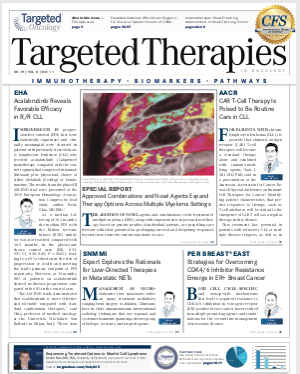Safety, Feasibility Study Reveals Possible Benefit of Immune Cell Therapy in Pancreatic Cancer
Findings from a phase I study investigating the use of nonengineered T-cell therapy suggest that the therapy is safe and feasible in pancreatic cancer and may offer benefit to patients. The novel therapy targets the tumor-associated antigens PRAME, SSX2, MAGEA4, NY-ESO-1, and Survivin.
Brandon G. Smaglo, MD

Brandon G. Smaglo, MD
Findings from a phase I study investigating the use of nonengineered T-cell therapy suggest that the therapy is safe and feasible in pancreatic cancer and may offer benefit to patients. The novel therapy targets the tumor-associated antigens (TAAs) PRAME, SSX2, MAGEA4, NY-ESO-1, and Survivin. Lead author Brandon G. Smaglo, MD, presented results from the 3-arm study during a poster session at the Immune Cell Therapies for Cancer: Successes and Challenges of CAR T Cells and Other Forms of Adoptive Therapy conference in San Francisco, California.1
A total of 18 patients (arm A: 9; arm B: 6; and arm C: 3) received up to 6 monthly infusions of 1 × 107 multiTAA-T cells/m2. Smaglo, an assistant professor of internal medicine (oncology) at the Dan L. Duncan Comprehensive Cancer Center of Baylor College of Medicine in Houston, Texas, and colleagues reported that the patients had not received prior protocol-associated lymphodepletion.
Patients in arm A had unresectable/metastatic disease and responded to standard first-line chemotherapy. Arm B included patients with progressive disease or who were intolerant to therapy after the first line, and patients in arm C had resectable disease and had completed preoperative chemotherapy/radiotherapy (TABLE).1
A breakdown of clinical responses in arm A demonstrated that 1 patient had disease progression, 1 patient had a mixed response, and 7 had ongoing radiographic stable disease of duration that ranged from 6 to 15 months. Radiographic scans of patients 1 (a partial responder), 3 (a partial responder), and 7 (a complete responder) revealed post-multiTAA T-cell benefit that was associated with an increase in the circulating frequency of T cells directed against both targeted and nontargeted TAAs. Four patients had stable disease.

In arm B, of the 6 patients treated who had progressive disease, 4 continued to progress on treatment, 1 patient was clinically stable, and 1 patient was clinically well and stopped other therapy. Two of 3 patients in arm C were still receiving postoperative infusions and adjuvant therapy. The investigators noted that T-cell infiltration was observed at the tumor site for all patients. Investigators reported an increase in the circulating frequency of T cells against both targeted and nontargeted antigens in arms B and C.
“We are encouraged by the early results suggesting that the T-cell therapy we are testing is a feasible approach to pancreatic adenocarcinoma treatment that is tolerable and shows signs of clinical activity,” Smaglo said in a release.
“We are excited that not only have we seen some clinical activity with our T-cell therapy, but we have seen no serious adverse effects, including no infusion-related systemic toxicity or neurotoxicity,” said Smaglo. “The tolerability of the treatment is very important because other treatments for pancreatic adenocarcinoma can cause severe adverse effects.”
The researchers reported that 35 clinical-grade multiTAA cell lines have been generated; they include CD3-positive T cells with a mixture of CD4-positive and CD8-positive T cells. MultiTAA T cells are created by culturing autologous peripheral blood mononuclear cells in the presence of a cytokine “cocktail”; it includes dendritic cells that serve as antigen presenting cells. Using whole antigen avoids the restrictions imposed by human leukocyte antigen when used by transgenic binding proteins specific for single peptides.
A limitation of the study, according to Smaglo, is that only a small number of patients have been treated to date. To fully determine the effectiveness of this T-cell therapy, many more patients need to be treated, said Smaglo. Another study limitation that Smaglo emphasized is that creating a customized treatment is time-and labor-intensive for both patients and clinicians, which could affect the scalability of the technology in the future.
Reference:
Smalgo BG, Musher BL, Lulla PD, et al. Targeting pancreatic cancer using nonengineered, multiantigen-specific T cells (TACTOPS). Presented at: Immune Cell Therapies for Cancer: Successes and Challenges of CAR T Cells and Other Forms of Adoptive Therapy; Abstract PR01; July 19-22, 2019; San Francisco, CA.
